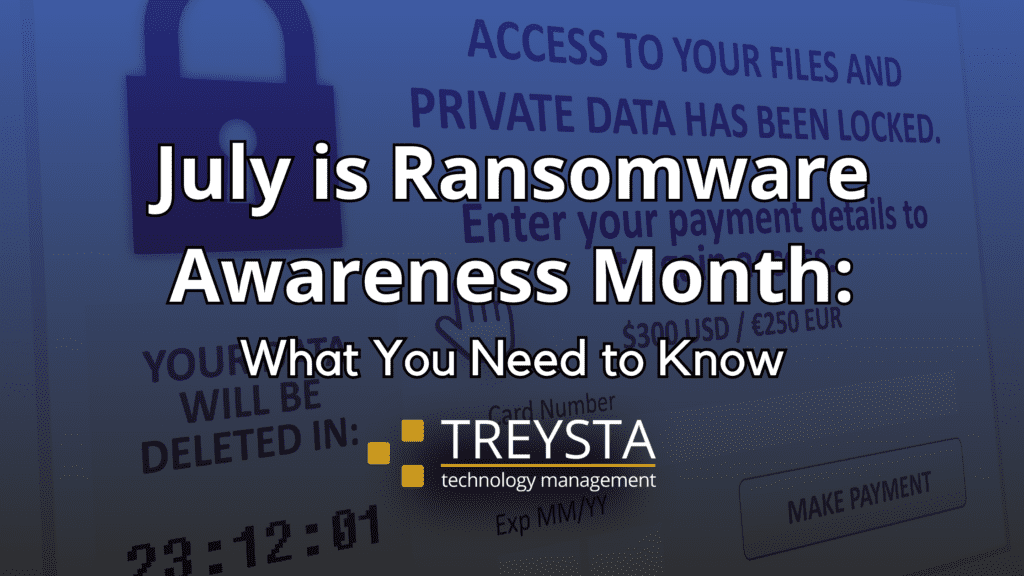We will also provide some resources for learning more about ransomware and how to stay safe.
What is Ransomware Awareness Month?
With bright sunny skies and family vacations, July also brings Ransomware Awareness Month (RAM). This yearly campaign’s purpose is to raise the understanding about ransomware and its impact on businesses and individuals. RAM aims to encourage people to protect themselves from this form of cyberattack, as well as motivate businesses to take steps to secure their networks.
With cyber threats becoming more common, it is vital for everyone to stay vigilant. By taking proactive measures, we can protect our valuable data from ransomware attacks. During this month-long campaign, cybersecurity organizations, government agencies, and industry experts join together to highlight the importance of ransomware prevention, detection, and response.
Ransomware Awareness Month aims to encourage individuals and businesses to educate themselves on the rising threat of ransomware.
What is Ransomware?
First, what is ransomware? Ransomware is a type of malware, or malicious software, that blocks access to a victim’s data and demands a payment to release it. It is designed to extort money by holding valuable data hostage. Once it breaches your system, it may also attempt to spread and connect to every device within your network. Unfortunately, this type of attack has become increasingly common in recent years and can have a devastating impact on those affected.
In fact, according to the latest statistics, every 19 seconds there is a ransomware attack happening somewhere in the world. Furthermore, every 40 seconds a business suffers a ransomware attack. The volume of attacks is expected to continue to grow into the future. Experts expect this to rise to every 2 seconds by 2031.
Ransomware can infiltrate systems in many ways. This includes malicious email attachments, infected websites, or by using weaknesses in software or operating systems. Cybercriminals often use social engineering techniques to trick users into clicking on malicious links or downloading infected files. The FBI has stated that the most common way to do this is through email phishing campaigns. However, this can also include bad links sent through social media profiles and messages.
Ransomware is a form of cyberattack which uses malware to infect a user, lock their data, and demand a payment to release it.
Examples of Recent Ransomware Attacks
It is important for individuals and organizations to realize ransomware attacks can impact anyone, regardless of their size, industry, or perceived value. As a matter of fact, Pennsylvania saw more reported victims of cybercrime than Canada, India, Australia, France, and South Africa combined in 2022.
Many ransomware victims believed it wouldn’t happen to them, or because their business is too small. Sadly, this is a common misconception. Ransomware gangs often target small businesses because they are less likely to have the resources to defend themselves. Per a recent cybersecurity report, 82% of ransomware attacks target small businesses.
Ransomware attacks aren’t just in the news in faraway countries. They happen every day to individuals and organizations, including neighbors and friends. Here are just a few of the most recent ransomware attacks that happened to Pennsylvania businesses in 2023:
Penncrest School District in Saegertown, Pennsylvania was hit by a ransomware attack that encrypted the district’s computer systems.
The district was forced to close for several days while it worked to recover its data.
Lehigh Valley Health Network in Allentown, Pennsylvania was hit by a ransomware attack that encrypted the network’s computer systems.
The attack disrupted patient care and forced the hospital to cancel some surgeries.
The University of Pittsburgh Medical Center was hit by a ransomware attack that encrypted the network’s computer systems.
The attack disrupted patient care and forced the hospital to cancel some appointments.
How to Protect Yourself During Ransomware Awareness Month and into the Future
There is no set price when it comes to a ransomware attack. The demands may be from a few hundred dollars and reach into the millions of dollars for larger organizations. Keep in mind, this does not include the loss of productivity or the legal fees that come with a ransomware attack. One way to mitigate this cost is to purchase cyber insurance. Cyber insurance is an essential tool for businesses that want to protect themselves from the financial and reputational damage caused by cyberattacks.
The FBI and other law enforcement agencies advise victims to not pay their hacker’s ransom demand. Regrettably, there is no guarantee the hacker will release your data, or that it’s not already on the darkweb. Reports have shown, even with the payment made, 24% of organizations were not able to recover their data. Paying the ransom demand may also encourage further criminal activity.
Yes, ransomware attacks should be reported to the U.S. government. One source to submit a ransomware attack is through the FBI’s Internet Crime Complaint Center. Another source is the CISA’s Incident Reporting System. Reporting an attack makes the internet a safer place for everyone and may help to bring cybercriminals to justice.
- Do not reuse the same password across multiple websites.
- Enable multifactor authentication whenever possible.
- Be careful about what links you click on and what files you open.
- Back up your data regularly.
- Do not accept social media requests from profiles you do not know.
- Have a plan in place in case you are hit by ransomware.
- Partner with a local managed service provider for cybersecurity support.
- Keep your anti-virus and anti-malware software up to date.
- Purchase cyber insurance to protect your business.
Ransomware Awareness Month Facts
July is Ransomware Awareness Month, bringing attention to the risks of ransomware attacks. But that does not mean you shouldn’t remain vigilant throughout the year. Remember:
95%
of all data breaches are caused by an employee mistake
82%
of ransomware attacks target small businesses
60%
of small businesses close after 6 months due to a cyberattack
43%
of all cyberattacks, including ransomware, are aimed at small businesses
40%
Every 40 seconds, a business suffers a ransomware attack.
Cybersecurity is everyone’s responsibility. Ransomware attacks do not discriminate. They target individuals, businesses, non-profits, and even schools. By increasing your cybersecurity efforts, you can reduce the risk of a ransomware attack. Remember, the consequences of a ransomware attack can be devastating. You are not guaranteed to recover your data, regardless of if you pay.
Always be mindful about what links you click and what files you open. When in doubt, go directly to a website’s homepage, instead of a referring link. Stay vigilant and help reduce the risks of a ransomware attack this Ransomware Awareness Month.
Ransomware Awareness Month Resources
Video Courtesy of KnowBe4: https://blog.knowbe4.com/the-evolution-and-future-of-ransomware
External Reading:
Ransomware Awareness Campaign Fact Sheet – CISA
Purchase Cyber Insurance – EHD Insurance
Your Local IT Support Company
Don’t leave your cybersecurity to chance. Join forces with TREYSTA technology management and experience the peace of mind that comes with knowing your organization is fortified against cyber threats. Contact us today to schedule a free consultation and take the first step toward a more secure future.
Find out why businesses in Harrisburg, Hanover, York, and throughout Central PA and Northern MD trust TREYSTA as their technology experts.





